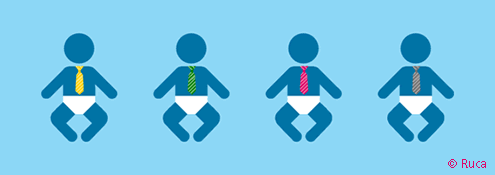30 Jun Niños como fuente de ideas (del libro Futuro Presente)

English Follows | Chinese Follows
Un día, en casa, intentaba explicarle a mi hijo menor, cuando tenía unos cuatro años, cual era la diferencia entre los conceptos ayer, hoy y mañana. No había manera: cuando se iba a la cama preguntaba si al despertarse sería hoy, ayer o mañana. Un lío, vaya. Pero de pronto, una mañana, vino hacia la cocina donde yo estaba y me dijo: ?ya lo entiendo: hoy es el mañana de ayer?. ¡Exacto!, quién podía haberlo definido de manera más concreta, precisa y resumida. En otra ocasión, en ésta con el mayor de mis tres hijos, comenté que por error me había comprometido a estar en dos sitios distintos a la vez, y que ello me amargaba porque no sabía cómo resolver el problema. Sin pensárselo un momento, mi hijo me dijo que ?me pusiera enfermo?, real o imaginariamente, y ?fin del problema?. Una solución brillante que a mí nunca se me hubiera ocurrido.
La libertad creativa de los niños es una fuente de ideas por explorar (y, quizas, por explotar). Dicen lo que piensan, y eso vale mucho. Además, ven ?desde fuera de la caja? (outside the box), simplemente porque nadie les ha recluido en ninguna, aún. Piensan sin tantos condicionantes, y se fijan en elementos que nosotros obviamos, porque así nos han educado. Sus respuestas a nuestras preguntas pueden ser notablemente diferentes. Lo que es relevante para ellos es invisible para nosotros.
Hay, por consiguiente, una interesante oportunidad de "sumar niños" a nuestras fuentes de creatividad. Algunas ciudades, por ejemplo, ya lo han hecho a la hora de pensar nuevos parques. Se pide a grupos de niños en los colegios de la zona que aporten ideas de cómo les gustaría que fueran. Más aún, creo que es una buena idea que las ciudades tengan un Consejo de Niños que aporten respuestas alternativas a los problemas de la ciudad. En mi opinión, cuando a los niños se les da responsabilidades acostumbran a estar a la altura. Las empresas de videojuegos ya lo hacen, puesto que disponen de niños como beta-testers (probadores). Porque, ¿quién mejor que ellos para mejorar un juego visual, teniendo en cuenta cómo han desarrollado la parte del cerebro que procesa las imágenes? (nosotros somos seres Gutemberg, no Matrix).
Algo parecido lo encontramos en las televisiones, para perdir la opinión de los programas. Además, el SMS es una fantástica herramienta para recabar opiniones al instante (Ver el planteamiento de la empesa MobileYouth para recabar vía SMS ?opiniones sobre productos y servicios móviles?).
Pero el reto es mayor aún. Así, por ejemplo, la empresa suiza
At home one day, I was trying to explain to my youngest son, when he was about four years old, what the difference was between the concepts yesterday, today and tomorrow. There was just no way of making him understand: When he went to bed he asked if when he woke up it would be today, yesterday or tomorrow. It was a tricky one. Then suddenly one morning he came up to me in the kitchen and said: "I've got it: Today is yesterday's tomorrow". Exactly! Who could have defined it more specifically, precisely and concisely?On another occasion, this time with the oldest of my three children, I mentioned that I had mistakenly agreed to be in two different places at the same time and that this was bothering me because I didn't know how to solve the problem. Without thinking twice my son told me to "be ill", either for real or in my imagination, and "problem over". A brilliant solution that I would never have thought of. There is therefore an interesting opportunity to add children to our sources of creativity. Some cities, for example, have already done this when devising new parks. Groups of children from schools in the area are asked to contribute ideas of what they would like the parks to be like. I also think that it is a good idea for cities to have a Children's Council which provides alternative answers to the city's problems. In my opinion, when children are given responsibilities they get used to rising to the challenge. The videogames companies are already doing this, as they use children as beta testers. After all, who better than them to improve a visual game, bearing in mind how they have developed the part of the brain which processes images? (We are Gutenberg beings not Matrix beings). Television companies do something similar, in order to find out the children's opinion of programmes. Furthermore, SMS's are a fantastic tool for obtaining instant feedback (See the approach of the company Brainstore? 利用小朋友及年轻人 (mini-brains) 来反应大型跨国公司所策划好的挑战,因为他们是唯一能够彻底发挥创新的想法,也是唯一能自由发挥思考的。.
The creative freedom of children is a source of ideas to be explored (and perhaps exploited). They say what they think and that is worth a lot. Furthermore, they see things from outside the box, simply because no one has shut them away in one, yet. They are able to think without as many determining factors, and notice things that we ignore, because that is how we have been educated. Their answers to our questions can be noticeably different. What is relevant to them is invisible to us.



Sorry, the comment form is closed at this time.